

Trump Gave W.H.O. a List of Demands. Hours Later, He Walked Away. GENEVA — In late May, the American ambassador in Geneva, Andrew Bremberg, went on a rescue mission to the World Health Organization headquarters.
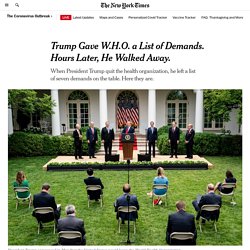
He told its director general, Tedros Adhanom Ghebreyesus, that despite weeks of threats that President Trump would quit the health organization, the relationship could still be salvaged. Mr. Bremberg hand-delivered a list of seven demands that American officials saw as the beginning of discreet discussions. Hours later, Mr. Trump took the lectern outside the White House and blew it all up, announcing that the United States would leave the W.H.O. If Mr. With Mr. While the Trump administration’s demands are now moot, they offer a glimpse into both the growing American frustration with the W.H.O. and Mr.
As has often been the case during Mr. WHO's Covid-19 inquiry is a shrewd move in a sea of disinformation. In the world of epidemiology it’s sometimes said that pandemics are lived forwards and understood backwards.
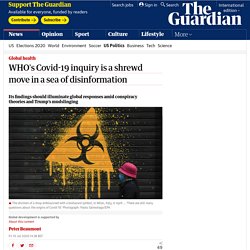
We encounter them head-on, chaotically, trying to fathom the disease in real time even while trying to mitigate its impact. Lessons generally come later as the evidence accumulates. What’s also true is public health, especially on a global scale, is rarely separable from politics. Once we have a vaccine, how will it be shared fairly around the world? In December 2006, the Indonesian authorities refused to hand over samples of the bird flu virus without guarantees that it would benefit from any vaccine produced from them.
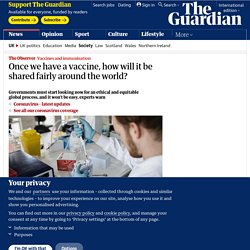
Amid the swine flu outbreak in 2009, the Australian government ordered a vaccine manufacturer to meet its demand before fulfilling orders overseas. That November, after several rich nations had secured vaccines, officials from the World Health Organization aired concerns that disaster could lie ahead. “Things would be much worse if the pandemic had been more severe, and it would be more difficult to create some fairness in the distribution of vaccine,” said Marie-Paule Kieny, the then head of the WHO’s initiative for vaccine research. “Governments might be less inclined to share the vaccine that they have.” Urgent health challenges for the next decade.
As a new year and a new decade kick off, WHO is releasing a list of urgent, global health challenges.
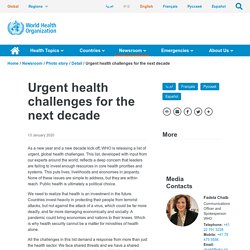
This list, developed with input from our experts around the world, reflects a deep concern that leaders are failing to invest enough resources in core health priorities and systems. This puts lives, livelihoods and economies in jeopardy. None of these issues are simple to address, but they are within reach. Public health is ultimately a political choice. We need to realize that health is an investment in the future. The coronavirus lays bare the limits of WHO's health diplomacy with China. On social media this week the insults were flying thick and fast, some tinged with racism, but all with a common theme: how the World Health Organization, and its head, Dr Tedros Adhanom Ghebreyesus, was effectively doing the bidding of the Chinese government in the midst of the Wuhan coronavirus outbreak.
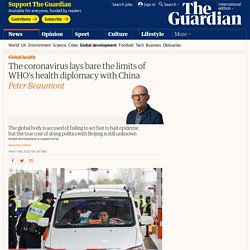
It is a charge that has also been expressed in less offensive terms elsewhere in columns and articles, some of which have focused on whether, in praising China’s response to the deadly Wuhan coronavirus outbreak during a visit to Beijing, Tedros allowed himself to become complicit in China’s flawed handling of the outbreak in its early days? In some respects, it is a hoary old paradox, familiar to many international bodies and NGOs. Article: The evolution of human rights in World Health Organization policy and the future of human rights through global health governance. Director Devi Sridhar's lecture 'How do we manage global health & are we getting better at it?' is available on @LMU_Muenchen iTunes site @EdinUniUsher @BiomedSelfSoc @EdinUniMedicine.
Blog — GLOBAL HEALTH GOVERNANCE PROGRAMME. Health and Small Islands in a Changing Environment. Econometrics of suffering: Health policy, economics & human life — GLOBAL HEALTH GOVERNANCE PROGRAMME. Econometrics is the application of statistical and mathematical methods in the field of economics to describe the numerical relationships between key economic forces such as capital, interest rates and labour.
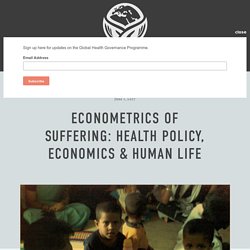
Health sector leading the way on adapting SDGs in Kyrgyzstan. All Member States of the United Nations adopted the 2030 Agenda for Sustainable Development and its 17 Sustainable Development Goals (SDGs) in 2015.
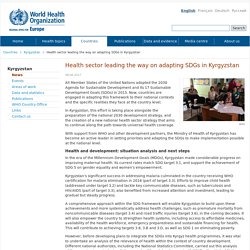
Now, countries are engaged in adapting this framework to their national contexts and the specific realities they face at the country level. In Kyrgyzstan, this effort is taking place alongside the preparation of the national 2030 development strategy, and the creation of a new national health sector strategy that aims to continue along the path towards universal health coverage.
With support from WHO and other development partners, the Ministry of Health of Kyrgyzstan has become an active leader in setting priorities and adapting the SDGs to make implementation possible at the national level. Health and development: situation analysis and next steps. All roads lead to Geneva.
WHO elects first ever African director-general after tense vote. The World Health Organisation has its first ever director-general from Africa, after the election of Dr Tedros Adhanom Ghebreyesus, the former Ethiopian health minister.
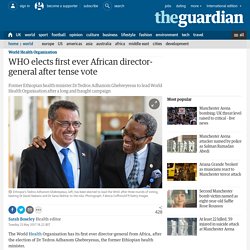
Dr Tedros, as he is known, beat the British candidate, Dr David Nabarro, after three tense rounds of voting on Tuesday. Third was Pakistan’s Dr Sania Nishtar. Wanted: Top doctor to care for 7 billion people. EASE.
Alexander E. Kentikelenis (2017) Structural adjustment and health: A conceptual framework and evidence on pathways. Soc Sci Med S0277-9536(17)30110-7 – mcquillan_ruth
An Error Occurred Setting Your User Cookie. This site uses cookies to improve performance.

If your browser does not accept cookies, you cannot view this site. Setting Your Browser to Accept Cookies There are many reasons why a cookie could not be set correctly. Below are the most common reasons: You have cookies disabled in your browser. Why Does this Site Require Cookies? World lagging behind on global health targets, researchers warn. Global health governance – the next political revolution. EASE. Global Health - Global Health Security - Why It Matters. Disease Threats Can Spread Faster and More Unpredictably Than Ever Before People are traveling more.
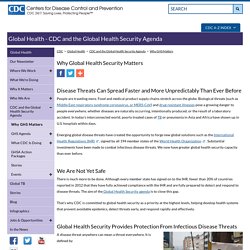
Food and medical product supply chains stretch across the globe. Biological threats (such as Middle East respiratory syndrome coronavirus, or MERS-CoV) and drug-resistant illnesses pose a growing danger to people everywhere, whether diseases are naturally occurring, intentionally produced, or the result of a laboratory accident. In today’s interconnected world, poorly treated cases of TB or pneumonia in Asia and Africa have shown up in U.S. hospitals within days. Emerging global disease threats have created the opportunity to forge new global solutions such as the International Health Regulations (IHR), signed by all 194 member states of the World Health Organization. We Are Not Yet Safe There is much more to be done. Global Health Security Provides Protection From Infectious Disease Threats A disease threat anywhere can mean a threat everywhere. Facing forward after Ebola: questions for the next director general of the World Health Organization.
Governing the UN Sustainable Development Goals: interactions, infrastructures, and institutions. Three of the eight Millennium Development Goals (MDGs) concerned health. There is only one health goal in 17 proposed Sustainable Development Goals (SDGs). Critiques of the MDGs included missed opportunities to realise positive interactions between goals.1 Here we report on an interdisciplinary analytical review of the SDG process, in which experts in different SDG areas identified potential interactions through a series of interdisciplinary workshops. Journal article: Shifting to Sustainable Development Goals — Implications for Global Health. Millennium Development Goals (MDGs) to Sustainable Development Goals (SDGs): Addressing Unfinished Agenda and Strengthening Sustainable Development and Partnership.
Article: Global health ethics: an introduction to prominent theories and relevant topics. List of the UN Sustainable Development Goals.
Finance & Development, December 2014. Finance & Development, December 2014, Vol. 51, No. 4.